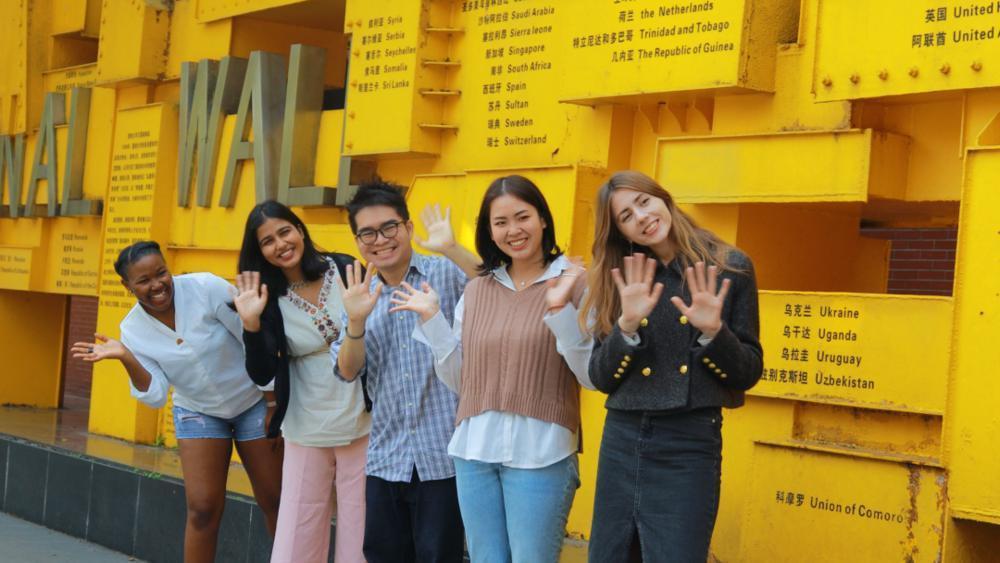In March, bright spring days were decked out in fresh flowers. Elizaveta, who had just finished her course, strolled around the campus and enjoyed the spring. This was the first spring she spent in Guangzhou.

The idea of going to China had been in her mind for a long time. She used to watch some movies about China with her mother as a child, and was captivated by the classical atmosphere in the movies. When she started to learn Chinese during her undergraduate years, the level and oblique tones opened the door of Chinese language for her, and aroused her yearning for China again.
On the day of her graduation, Elizaveta learned that her application for study in China, which she had been preparing for nearly a year, had finally been approved. Good things came in pairs, making the day memorable. While she was happy, Elizaveta was also a little worried about her upcoming study, since it was her first time to go to China. With expectation and slight apprehension, Elizaveta stepped on the plane and started her trip across more than 4,350 miles to China.

In the six months since she came to China, although sometimes she got a spot of bother, there were always people willing to help. "Because someone came to help me, so many things went easier. If I was the only one to cope, I would really be stressed, " said Elizaveta.
Talking about her impression of China, Elizaveta said there came two styles of China in her mind: a modern China with rapid development and tall buildings, and an ancient China with a long history and rich culture. After coming to Guangzhou to study, she likes to visit historical and cultural sites with her friends to learn more about Chinese culture, hang out in food markets, and find good Chinese noodle shops to feel the real Chinese life. For Elizaveta, the modern China of today is inseparable from the ancient China of the past, and she is eager to learn about China's past and to better understand the present and future of China.
She has a great interest in all things Chinese, and it is a great treat for her to be back in the offline classroom. The face-to-face interaction allows her to be more focused and to maintain a real connection with her schoolmates and teachers, which is the thing that online classes can't bring her.
After winter break, more and more students have returned to campus. Elizaveta feels the vibe and passion from these young faces. "The students here are very active, they learn their majors, play and dance. They can also speak many languages, and care about their health!" "Safe, free, young, open,and noodles," this is how Elizaveta sums up her feelings of China and Jinan University.
跨越7000公里,拥抱中国文化
3月,春光明媚,鲜花盛开。刚刚结束课程的魏丽莎惬意地漫步在校园,感受着春天的气息。这是她在广州度过的第一个春天。
“去中国看看”是很久之前就萌生在魏丽莎心中的想法。小时候她跟着妈妈看过一些有关中国的电影,影视作品中的古典氛围将她深深吸引;本科时她开始尝试学习中文,平仄的声调为她打开了汉语的大门,也再次唤起了她内心深处对于中国的向往。
参加本科毕业典礼的那一天,丽莎得知自己准备了近一年的留学申请终于通过了审核,两件好事同时发生,对她来说,那着实是难以忘记的一天。高兴之余,丽莎对自己即将到来的留学生活也有一点点担心,因为这是她第一次前往中国。怀着这种期待又略微忐忑的心情,丽莎踏上飞机,开启了这趟跨越7000多公里的中国之行。
来到中国的这6个多月,虽然有时也会遇到一些小麻烦,但总会有人愿意为她提供帮助。“因为有人来帮我,所以许多事情就容易了起来,但如果只有我一个人来应对,我真的会很有压力。”丽莎说。
谈及对中国的印象,丽莎说她脑海里有两种风格的中国:一个是发展迅速、高楼林立的现代中国,另一个是历史悠久、文化厚重的古老中国。来到广州读书后,她喜欢和朋友一起参观历史文化景点,了解中国文化,或者逛一逛菜市场,寻找好吃的中国面馆,感受真实的中国生活。在丽莎看来,当下现代的中国与过去古老的中国是无法分割的,她迫切地想要了解中国的过去,想要更好地理解中国的当下和未来。
她对中国的一切都抱有极大兴趣,对她来说,能够回到线下课堂是一件极其幸福的事情。面对面的交流会让她更加专注,也能够让她与老师同学保持真正的联结,这是线上课堂无法带给她的学习体验。
寒假结束后,越来越多的同学重返校园,丽莎也感受到了一张张年轻的面孔给校园带来的活力。“学校里的同学都非常活跃,他们要学习自己的专业,会打球跳舞,说很多种语言,还很关心身体健康!”“安全、自由、年轻、开放,还有面条。”这是丽莎对中国和暨南园的概括。
视频素材来源|暨南大学
视频剪辑|黎杰文
翻译|古司祺
校对|彭继业
责编|王瑜瑛









